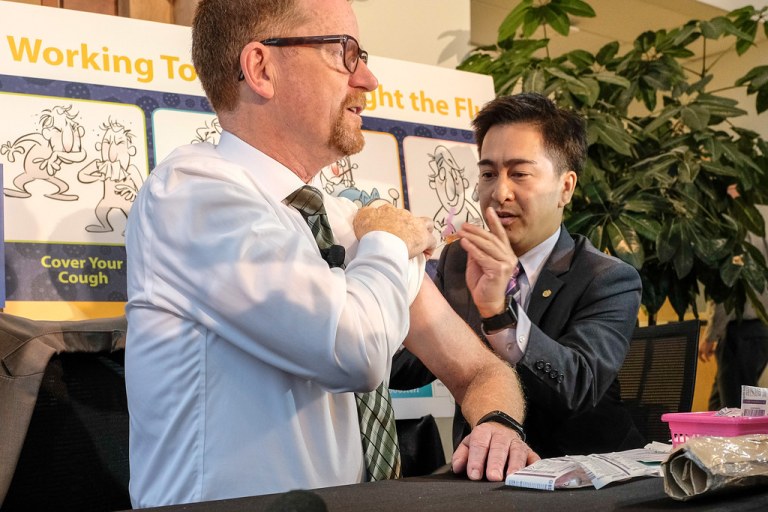Reviewed by: Elizabeth Hobbs
Two Huntsville doctors bust 6 myths about cold + flu season
Reading time: 6 minutes
Sponsored

Getting sick during the winter feels inevitable, even if you live in a semi-warm climate like Huntsville.
Thankfully, we got some popular myths busted by two Huntsville Hospital for Women & Children doctors. Plus, we learned valuable tips to keep you and your kids healthy this season. Keep reading to learn more.
Meet Dr. Todd Fleenor + Dr. Kym Middleton

Minutes after meeting Dr. Fleenor and Dr. Middleton, I quickly realized that they were everything doctors should be—kind to their patients, experts in their craft and quick on their feet.
Their reasoning on why they became pediatric doctors confirmed this even further:
“I wanted a career in which I can make an impact on the world—specifically in pediatrics. I love interacting with kids and feel like I can make a difference in their lives.”
Dr. Fleenor, Pediatric Emergency Medicine Physician
“I really like science, learning and hanging out with kids. Being a pediatrician checked all of those boxes for me. I love getting to help make the world a better place.”
Dr. Middleton, Pediatric Hospitalist
Myth #1: Kids can’t learn good hygiene

Fact: It is possible to teach your kids good hygiene, whether they’re five or 15.
“It’s definitely harder to teach good hygiene to younger age groups. But you can start with the practical things—not drinking after one another, coughing correctly, washing your hands before you put something in your mouth and more. This goes for teenagers, too.”
Dr. Fleenor, Pediatric Emergency Medicine Physician
Myth #2: Fevers are bad
Fact: Fevers are not a terrible thing; they’re your body’s sign that it’s working appropriately.
“Fevers are just your body’s way of fighting off sickness. Your child doesn’t immediately need to be seen in the ER or doctor’s office unless the fever lasts five days in a row or they’re dehydrated.”
Dr. Middleton, Pediatric Hospitalist
“Families tend to worry about how high the temperature is, but the main data point we take into account is how long the fever has run.”
Dr. Fleenor, Pediatric Emergency Medicine Physician
Myth #3: Going out in the cold makes you sick

Fact: The cold temperature doesn’t make you sick, but it is easier to get sick during the winter for a couple of reasons.
“It’s not so much the cold that makes us sick as our behaviors during the winter.
Everyone stays indoors more, where germs can spread easily. Plus, the cold, dry air allows viruses to stick around longer in the environment and on surfaces. That’s why it’s important to wash your hands regularly.”
Dr. Middleton, Pediatric Hospitalist
Learn more about how Huntsville Hospital for Women & Children is caring for our city.
Myth #4: Feed a cold, starve a fever
Fact: You may have heard this phrase through the grapevine—meaning you should eat less when you have a fever to bring your body temperature down—but let it “die on the vine” with you. If you have a fever, you need all the nutrition you can get!
“You need nutrition to stay healthy and fight infections. It’s important to hydrate—especially if you’re having fevers, they’re going to dehydrate you.
Plus, babies should not be having straight water. They need liquids with the appropriate electrolytes, like Pedialyte.”
Dr. Middleton, Pediatric Hospitalist
Myth #5: Antibiotics treat viral infections

Fact: Antibiotics do not treat viral infections and are meant for bacterial infections like strep throat, UTIs, etc.
“Just because you have a cough and fever does not mean it’s a bacterial infection. Antibiotics will not treat a cold or the flu.”
Dr. Middleton, Pediatric Hospitalist
“I see a lot of families come in and ask for an antibiotic if their child has had a fever for around 30 minutes. Their first thought is ‘We need medicine,’ but there are more effective ways to treat a cold or the flu.”
Dr. Fleenor, Pediatric Emergency Medicine Physician
Myth #6: Over-the-counter cough + cold medicine work for children under five
Fact: Over-the-counter medicine is not extremely helpful for adults’ cough and cold, and it definitely shouldn’t be given to young children.
“Over-the-counter cough and cold medications are not recommended for kids under four years of age. If a child has a cough and congestion, you can use a cool mist humidifier and warm liquids with honey to help with their sore throat.
Children older than two can benefit from mentholated rubs.”
Dr. Middleton, Pediatric Hospitalist
“Suctioning the nose at home for children two and under is one of the best things you can do for respiratory symptoms.”
Dr. Fleenor, Pediatric Emergency Medicine Physician
Notes:
- Avoid giving honey to children under 12 months as it can increase their risk of botulism.
- Fevers under 2 months need to be evaluated right away.
- Ibuprofen should not be given under 6 months of age.
Huntsville Hospital for Women & Children is your local health resource

If you’re ever worried about your child’s sickness getting out of hand, Dr. Fleenor recommends calling your doctor’s office first. Most offices have after-hours lines, and they can advise if your child’s symptoms merit going to urgent care or the ER. Alternatively, they could reassure you that your child’s symptoms aren’t severe, and you can just come in the next day.
Need a primary care physician? Find the one closest to you.
If you do need to visit Huntsville Hospital for Women & Children’s pediatric unit, know that you’re in great hands working with doctors like Dr. Fleenor and Dr. Middleton.
“I love being a hospitalist because I get to see patients get better in real-time and care for a variety of populations. Taking care of newborn babies is especially meaningful because I get to celebrate with the families.
Plus, I love working with my coworkers, interacting with specialists across different departments and teaching med students and residents.”
Dr. Middleton, Pediatric Hospitalist
“Huntsville Hospital for Women & Children has been great, and I really like the people I work with.
Huntsville is an awesome place, and it’s been a good fit for me. I like how it’s a small yet growing town, and Huntsville Hospital for Women & Children offers a fantastic hybrid academic and private setting.”
Dr. Fleenor, Pediatric Emergency Medicine Physician
The information provided in this video is for general informational purposes only and is not intended as medical advice. Always consult with a healthcare professional for personalized recommendations and treatment.
Sponsored by:




